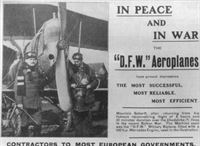Фотографии
-
The Bristol-Prier monoplane (RFC number 261 is illustrated) may have been the first British aeroplane to take part in a war, for both the Turks and the Bulgarians had them.
Самолёты на фотографии: Bristol Prier monoplane / P-1 - Великобритания - 1911
-
The first Greek military aeroplane, a Farman III powered by a 50 h.p. Gnome just out of its packing case and ready for its first flight, on May 13, 1912. Lt Dimitrios Kaberos is the pilot.
Самолёты на фотографии: Farman Farman-III - Франция - 1909
-
One of the rare aviation photographs from the Balkan wars: Maurice Farman type VII (80 h.p. Renault) which, according to the original caption, shows an Epirus Aviation Section machine landing after a raid on Bizani in January 1913.
Самолёты на фотографии: Maurice Farman MF.7 Longhorn - Франция - 1912
-
This picture appeared in an Austrian (Czech language) magazine in mid-1913 with the caption "Fighting Turks and waiting Rumanians" which suggests that it was taken before July 1913. It shows the two-seat Bleriot XXI, known as the "fish-tail", which appeared in this war on both sides. Note the roundels and French officer behind the Rumanian.
Самолёты на фотографии: Bleriot Bleriot-XIV / Bleriot-XXI - Франция - 1910
-
A DFW "Mars" biplane flying over San Stafano, probably in September 1912, when two of them were delivered. The German pilot Scherff flew this machine on several reconnaissance and bombing raids over the Chatalja lines near Constantinople. It was probably the first German aeroplane to be involved in a war.
Самолёты на фотографии: DFW Mars biplane - Германия - 1912
-
The DFW "Mars" biplane was used as a trainer in Germany until 1915. With its large fuel tank it was capable of long-range flying.
Самолёты на фотографии: DFW Mars biplane - Германия - 1912
-
This photograph of the DFW "Mars" shows well the enormous span (56ft) of this Teutonic biplane.
Самолёты на фотографии: DFW Mars biplane - Германия - 1912
-
The DFW firm was not slow in exploiting its product, as can be seen here in this advertisement which appeared in the aeronautical Press in May 1913. Scherff is seen at right.
Самолёты на фотографии: DFW Mars biplane - Германия - 1912
-
The DFW "Mars" was a sturdy machine with a 100 h.p. Mercedes engine. It was flown for the Turks by German pilots during the Balkan wars.
Самолёты на фотографии: DFW Mars biplane - Германия - 1912
-
Monoplane built by Harlan of Johannisthal in 1912 for the Turkish government. Harlans were delivered to San Stafano complete with bomb carriers as shown - the container is holding 10kg bombs. It is doubtful whether the two Harlans ever got off the ground during the conflict.
Самолёты на фотографии: Harlan military monoplane - Германия - 1912
Статьи
- -
- Curtiss Robin C-2 G-HFBM /Preservation Profile/
- Painted Wings
- Personal album. Civil
- Personal album. Military
- Skywriters
- Spitfire Notebook (3)
- A.Edney - California's Solent
- A.Lumsden - Westland Lysander /Take a card/ (4)
- C.Hall - Rich Mixture
- E.Gandet - Farewell little "Vampi"
- H.Woodman - The origins of aerial bombardment (8)
- J.Meadows - Flying for fun (2)
- J.Stroud - Wings of Peace
- J.Wenstedt - Fokker's first
- J.Yoxall - S.A. "Bill" Thorn /They who dared first/ (3)
- M.Oakey - Grapevine
- P.Jarrett - Nothing ventured... (4)
- R.Beamont - Atlantic Double









